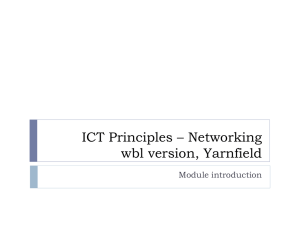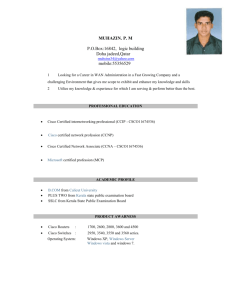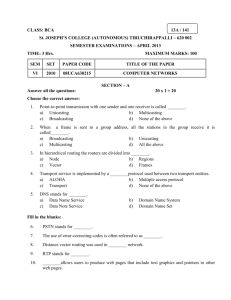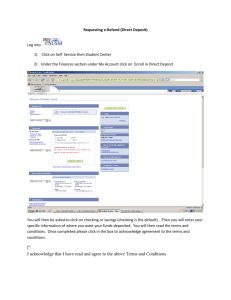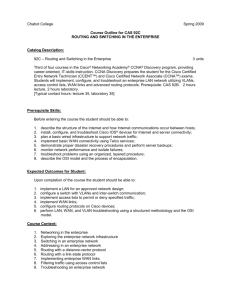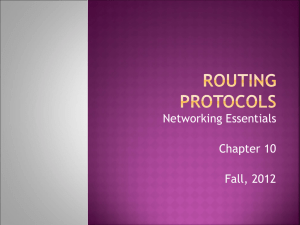Word Document - Computer Science Technology
advertisement
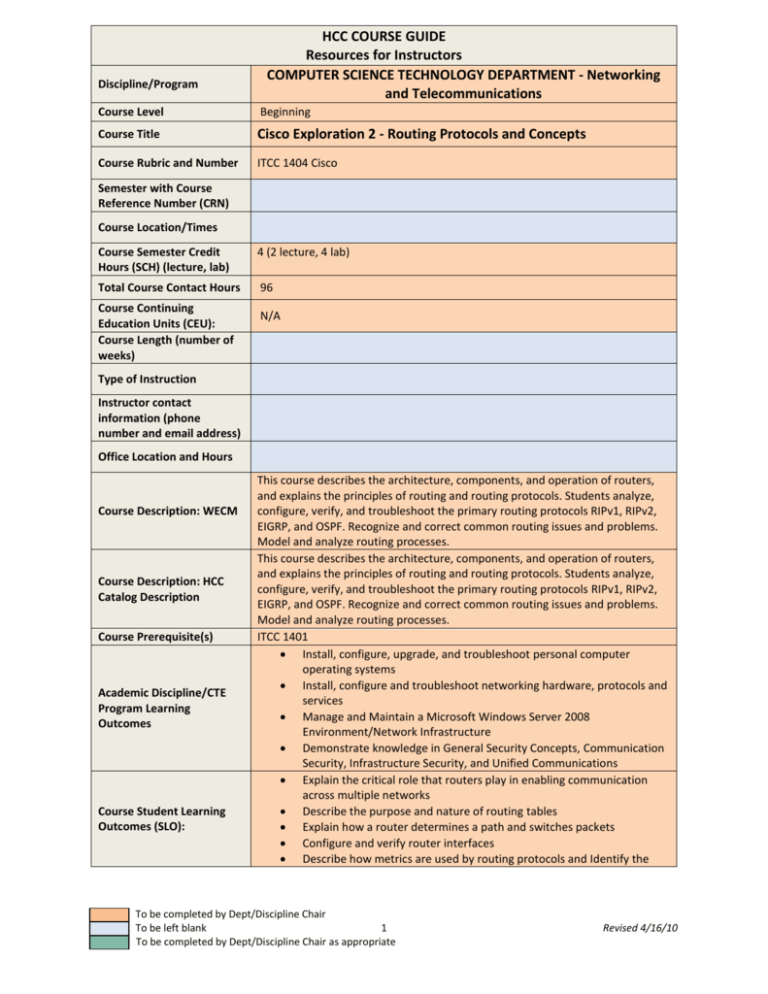
Discipline/Program HCC COURSE GUIDE Resources for Instructors COMPUTER SCIENCE TECHNOLOGY DEPARTMENT - Networking and Telecommunications Course Level Beginning Course Title Cisco Exploration 2 - Routing Protocols and Concepts Course Rubric and Number ITCC 1404 Cisco Semester with Course Reference Number (CRN) Course Location/Times Course Semester Credit Hours (SCH) (lecture, lab) 4 (2 lecture, 4 lab) Total Course Contact Hours 96 Course Continuing Education Units (CEU): Course Length (number of weeks) N/A Type of Instruction Instructor contact information (phone number and email address) Office Location and Hours Course Description: WECM Course Description: HCC Catalog Description Course Prerequisite(s) Academic Discipline/CTE Program Learning Outcomes Course Student Learning Outcomes (SLO): This course describes the architecture, components, and operation of routers, and explains the principles of routing and routing protocols. Students analyze, configure, verify, and troubleshoot the primary routing protocols RIPv1, RIPv2, EIGRP, and OSPF. Recognize and correct common routing issues and problems. Model and analyze routing processes. This course describes the architecture, components, and operation of routers, and explains the principles of routing and routing protocols. Students analyze, configure, verify, and troubleshoot the primary routing protocols RIPv1, RIPv2, EIGRP, and OSPF. Recognize and correct common routing issues and problems. Model and analyze routing processes. ITCC 1401 Install, configure, upgrade, and troubleshoot personal computer operating systems Install, configure and troubleshoot networking hardware, protocols and services Manage and Maintain a Microsoft Windows Server 2008 Environment/Network Infrastructure Demonstrate knowledge in General Security Concepts, Communication Security, Infrastructure Security, and Unified Communications Explain the critical role that routers play in enabling communication across multiple networks Describe the purpose and nature of routing tables Explain how a router determines a path and switches packets Configure and verify router interfaces Describe how metrics are used by routing protocols and Identify the To be completed by Dept/Discipline Chair To be left blank 1 To be completed by Dept/Discipline Chair as appropriate Revised 4/16/10 metric types used by dynamic routing protocols Identify the characteristics of distance vector routing protocols Describe the network discovery process of distance vector routing protocols using Routing Information Protocol (RIP) Describe the functions, characteristics, and operation of RIPv1 Compare and contrast classful and classless IP addressing Describe classful and classless routing behavior in routed networks Design and implement a classless IP addressing scheme for a given network Demonstrate comprehensive RIPv1 configuration skills Apply basic RIPv2 configuration commands and evaluate classless routing updates Describe the main features and operation of the Enhanced Interior Gateway Routing Protocol (EIGRP) Use advanced configuration commands with routers implementing EIGRP Describe the basis features and concepts of link-state routing protocols Explain the purpose, nature, and operation of OSPF CCNA 2: Routing Protocols and Concepts is the second of the four courses leading to the Cisco Certified Network Associate (CCNA) certification. CCNA 2 is an integral step towards achieving CCNA certification. CCNA 2 continues to familiarize Cisco Networking Academy Program students to the networking field. The course focuses on initial router configuration, Cisco IOS Software management, routing protocol configuration, TCP/IP Learning Objectives The course focuses on the following: Routing Basics IP addressing Subnetting LAN and WAN Interfaces Routing Protocols, and Routed Protocols Cisco IOS Configuring Routers Backing up IOS and Configuration RIP, EIGRP, and OSPF In addition, the course provides instruction and training in the proper care, maintenance, and use of networking software, tools, and equipment. Course will present information to meet the learning objectives for the Certified Cisco Network Associate (CCNA) certification test. The course has been designed for a semester and consists of theory and designated lab activities. A case study in using and configuring Routers is required. SCANS or Core Curriculum Competencies: If applicable Course Calendar (Weekly) Instructional Methods Student Assignments Student Assessment(s) To be completed by Dept/Discipline Chair To be left blank 2 To be completed by Dept/Discipline Chair as appropriate Revised 4/16/10 Instructor’s Requirements Program/Discipline Requirements: If applicable HCC Grading Scale A = 100 – 90;……………………………………4 points per semester hour B = 89 – 80: …………………………………….3 points per semester hour C = 79 – 70: …………………………………….2 points per semester hour D = 69 – 60: …………………………………….1 point per semester hour 59 and below = F………………………………..0 points per semester hour IP (In Progress) …………………………………………………….0 points per semester hour W(Withdrawn)……………………………………………………..0 points per semester hour I (Incomplete)……………………………………………………….0 points per semester hour AUD (Audit) ………………………………………………………….0 points per semester hour IP (In Progress) is given only in certain developmental courses. The student must re-enroll to receive credit. COM (Completed) is given in non-credit and continuing education courses. To compute grade point average (GPA), divide the total grade points by the total number of semester hours attempted. The grades “IP,” “COM” and “I” do not affect GPA. Instructor Grading Criteria Instructional Materials HCC Policy Statement: ADA Academic Honesty Student attendance 3-peaters Withdrawal deadline Distance Education and/or Continuing Education Policies (Required) Cisco Systems Networking Academy Program: First-Year Companion Guide, Second Edition (Cisco Press)ISBN: 1-58713-025-4 (Required) Cisco Systems Networking Academy Program: Lab Companion Volume I, Second Edition (Cisco Press)ISBN: 1-58713-027-0 Recommended: Cisco Systems Networking Academy Program: Engineering Journal and Work Book (Cisco Press).ISBN: 1-58713-026-2 Access Student Services Policies on their Web site: http://hccs.edu/student-rights Access DE Policies on their Web site: http://de.hccs.edu/Distance_Ed/DE_Home/faculty_resources/PDFs/DE_Syllabus.pdf Access CE Policies on their Web site: http://hccs.edu/CE-student-guidelines Test Bank Scoring Rubrics Sample Assignments Sample Instructional Methods/Activities To be completed by Dept/Discipline Chair To be left blank 3 To be completed by Dept/Discipline Chair as appropriate Revised 4/16/10
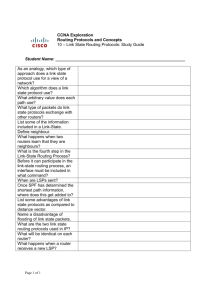
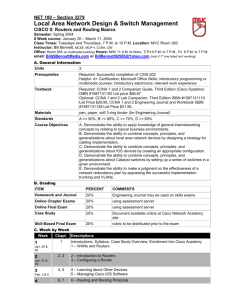
![Internetworking Technologies [Opens in New Window]](http://s3.studylib.net/store/data/007474950_1-04ba8ede092e0c026d6f82bb0c5b9cb6-300x300.png)
